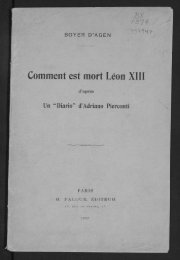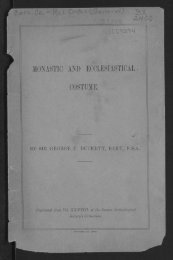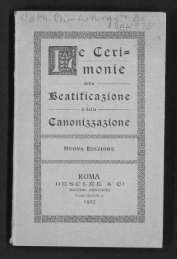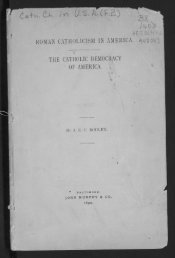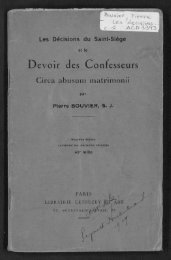Fabiola : or, The church of the catacombs - Digital Repository Services
Fabiola : or, The church of the catacombs - Digital Repository Services
Fabiola : or, The church of the catacombs - Digital Repository Services
Create successful ePaper yourself
Turn your PDF publications into a flip-book with our unique Google optimized e-Paper software.
40 LTBIA.<br />
bef<strong>or</strong>e u* She <strong>the</strong>n placed herself close to her companions, and<br />
prayed unceasingly with bowed head. She was so lost in prayer<br />
that she never moved her position, when <strong>the</strong> head <strong>of</strong> Justin was<br />
held up to <strong>the</strong> applauding multitude. At last when her turn<br />
came, she stepped f<strong>or</strong>ward, and answered <strong>the</strong> two questions:<br />
'<br />
F<strong>or</strong> whom do you die? and, does death appear so agreeable?'<br />
Her answer was: '<br />
F<strong>or</strong> my Faith in Christ, who is my Redeemer<br />
and my All. It is sweet to suffer f<strong>or</strong> a friend, but to die f<strong>or</strong><br />
God is heavenly delight'" Lydia with tears in her eyes, looked<br />
at one time on <strong>the</strong> earth, at ano<strong>the</strong>r towards Heaven. How will-<br />
ingly would she not have resigned her life at that moment, to be<br />
happy with her mo<strong>the</strong>r. Occupied with <strong>the</strong>se thoughts she left<br />
<strong>the</strong> F<strong>or</strong>um, and Felicitas led her to <strong>the</strong> great ampi<strong>the</strong>atre <strong>of</strong><br />
Nero, which from <strong>the</strong> adjacent high Colossug was called <strong>the</strong><br />
Coliseum. How many hundred Christians, true to <strong>the</strong> faith have<br />
stood on this Arena, how many lions and leopards have here lapped<br />
up <strong>the</strong> blood <strong>of</strong> <strong>the</strong> martyrs, and how did <strong>the</strong> applause <strong>of</strong> ninety<br />
thousand spectat<strong>or</strong>s thunder f<strong>or</strong>th, when such amusements were<br />
granted to pagan Rome! <strong>The</strong>re were still two o<strong>the</strong>r tombs in<br />
which Lydia felt <strong>the</strong> deepest interest, although in latter centuries<br />
<strong>the</strong> veil <strong>of</strong> oblivion has passed over <strong>the</strong>m.<br />
About twenty years bef<strong>or</strong>e Lydia's birth, <strong>the</strong>re lived in a Prov-<br />
ince <strong>of</strong> Umbria, a noble and richly endowed widow, named Sab-<br />
ina. This pagan matron had a Syrian slave, who with a rare zeal<br />
clung to <strong>the</strong> doctrines <strong>of</strong> <strong>the</strong> Gospel. She never ceased, so says<br />
<strong>the</strong> legend, praising <strong>the</strong> beauty <strong>of</strong> Christianity to her mistress;<br />
and as she exemplified it in her own pure and chaste life,<br />
she overcame <strong>the</strong> prejudice which her mistress had f<strong>or</strong> many<br />
years entertained against <strong>the</strong> Christians. Sabina became a<br />
Christian, and by <strong>the</strong> brilliancy <strong>of</strong> her virtues, was one <strong>of</strong> <strong>the</strong><br />
brightest <strong>or</strong>naments <strong>of</strong> <strong>the</strong> Church in <strong>the</strong> second century.<br />
<strong>The</strong> Emper<strong>or</strong> Adrian published an edict f<strong>or</strong> a persecution <strong>of</strong><br />
<strong>the</strong> Christians, and in consequence <strong>of</strong> this, <strong>the</strong> Govern<strong>or</strong> <strong>of</strong> <strong>the</strong><br />
province <strong>of</strong> Umbria imprisoned Sabina and her slave, Seraphica;<br />
and as <strong>the</strong> latter was <strong>the</strong> cause <strong>of</strong> Sabina's conversion, he had her<br />
beaten with rods till her tender body sunk under <strong>the</strong> cruelty, and<br />
8he was finally beheaded. Seraphica's mistress, who was released<br />
from prison in consideration <strong>of</strong> her high rank, procured <strong>the</strong> body<br />
<strong>of</strong> her martyred slave, and gave it hon<strong>or</strong>able interment. After<br />
this, she led a m<strong>or</strong>e retired life than ever, and night and day,<br />
besought her departed friend to obtain f<strong>or</strong> her <strong>the</strong> grace <strong>of</strong> martyrdom.<br />
Her prayer was heard, f<strong>or</strong> in <strong>the</strong> following year she<br />
was summoned by Elpidius, <strong>the</strong> new Govern<strong>or</strong> <strong>of</strong> Umbria to<br />
appear bef<strong>or</strong>e him, and he having shamefully maltreated her, <strong>or</strong>dered<br />
her to prison; when she arrived <strong>the</strong>re, she found herself<br />
filled with a "<br />
holy Joy: And is it <strong>the</strong>n possible" she<br />
" exclaimed,<br />
that I am to be admitted to a participation <strong>of</strong> <strong>the</strong> gl<strong>or</strong>y enjoyed<br />
by my Seraphica? She has obtained f<strong>or</strong> me this great privilege."<br />
She was again summoned <strong>the</strong> following day, but Elpidius finding<br />
all his entreaties vain, condemned her to be beheaded. She<br />
suffered on <strong>the</strong> very day upon which, in <strong>the</strong> preceding year, her<br />
companions gained <strong>the</strong> crown.* Although this Syrian slave b<strong>or</strong>e<br />
a great resemblance to Lydia in her glowing love f<strong>or</strong> Christ, and<br />
by <strong>the</strong> conversion <strong>of</strong> her mistress, still she had ano<strong>the</strong>r tie upon<br />
her affection ; having been baptized after that saint, whose name,<br />
it will be remembered, she b<strong>or</strong>e till she became a slave in<br />
A<strong>the</strong>ns.<br />
Lydia was seldom so oppressed with s<strong>or</strong>row as now, standing<br />
bef<strong>or</strong>e <strong>the</strong> tomb <strong>of</strong> this ranch-tried virgin, who b<strong>or</strong>e <strong>the</strong> miseries<br />
<strong>of</strong> slavery to her last breath. She cast a look upon her own interi<strong>or</strong>,<br />
and read <strong>the</strong>rein what her patron must have suffered, and<br />
also <strong>the</strong> joy she must have experienced when she saw her mis-<br />
tress one <strong>of</strong> <strong>the</strong> "True Fold." With what ard<strong>or</strong> did not she<br />
lha.ik St. Seraphica, f<strong>or</strong> <strong>the</strong> protection she bad aff<strong>or</strong>ded her<br />
through her past life, and recommended not only herself, but<br />
n1ao her newly converted mistress to <strong>the</strong> powerful protection <strong>of</strong><br />
both martyrs.<br />
* Not far from <strong>the</strong> Snlplce bridge, <strong>the</strong>re was a beautiful <strong>church</strong> built to St.<br />
Bftbina some hundred years later, and near which <strong>the</strong> Dominican monastery now<br />
elands, commanding a lovely view <strong>of</strong> <strong>the</strong> magnificent city. <strong>The</strong> erection <strong>of</strong> <strong>the</strong><br />
<strong>church</strong> ii dated u far back A. o. 430.<br />
Bef<strong>or</strong>e <strong>the</strong> tombs <strong>of</strong> <strong>the</strong>se holy women she took a vow <strong>of</strong> per-<br />
petual chastity, and resolved as a handmaid <strong>of</strong> <strong>the</strong> L<strong>or</strong>d, to<br />
devote herself to His service.<br />
CHAPTER<br />
LYDIA was now occupied in making preparations f<strong>or</strong> her return<br />
to A<strong>the</strong>ns, as she was receiving letter after letter from Metella,<br />
entreating her to delay her departure no longer; and urged by<br />
this last request, she sallied f<strong>or</strong>th at once, to make inquries on<br />
what day <strong>the</strong> next ship would sail f<strong>or</strong> Greece. On her way, she<br />
was surprised to meet one whose features were familiar to her,<br />
and on a moment's reflection, she recognized no o<strong>the</strong>r than ths<br />
priest Irenffius, whom she last saw on <strong>the</strong> ruins <strong>of</strong> Smyrna.<br />
F<strong>or</strong> many years he had preached <strong>the</strong> Faith in <strong>the</strong> South <strong>of</strong><br />
France, by <strong>the</strong> side <strong>of</strong> <strong>the</strong> aged Pothinus, bishop <strong>of</strong> Lyons, who<br />
like him, had been a disciple <strong>of</strong> St. Polycarp. Immediately<br />
after <strong>the</strong> persecution had commenced in Smyrna, a number <strong>of</strong><br />
Christians from Asia Min<strong>or</strong>, wandered to <strong>the</strong> south <strong>of</strong> Gaul, and<br />
Irenteus was one <strong>of</strong> <strong>the</strong> number. Trade and traffic had muile<br />
<strong>the</strong>ir way between <strong>the</strong>se two distant lands, where as <strong>the</strong> seed <strong>of</strong><br />
Christianity began to shoot, a tempest <strong>of</strong> persecution threatened<br />
to destroy it f<strong>or</strong>ever.<br />
Notwithstanding <strong>the</strong> Emper<strong>or</strong>'s decree. A. D. 177, in fav<strong>or</strong> <strong>of</strong><br />
<strong>the</strong> Christians, <strong>the</strong> Roman Govern<strong>or</strong> and <strong>the</strong> people <strong>of</strong> Lyons and<br />
Roman<br />
Vienne, still raged against <strong>the</strong>m with dreadful cruelty.<br />
justice, as Church hist<strong>or</strong>y inf<strong>or</strong>ms us, was, in <strong>the</strong> first three centuries<br />
very vacillating, and <strong>the</strong> immense extent <strong>of</strong> <strong>the</strong> Empire,<br />
easily explains how <strong>the</strong> Emper<strong>or</strong>'s decree was carried out in distant<br />
provinces, with greater <strong>or</strong> less exactness, acc<strong>or</strong>ding to <strong>the</strong><br />
dispositions <strong>of</strong> whatever Govern<strong>or</strong> was in auth<strong>or</strong>ity. <strong>The</strong> position<br />
<strong>of</strong> a Govern<strong>or</strong> depended m<strong>or</strong>e <strong>or</strong> less on <strong>the</strong> fav<strong>or</strong> <strong>of</strong> <strong>the</strong><br />
people, who it is well-known, had a downright passion f<strong>or</strong> san-<br />
guinary combats, and that <strong>the</strong>ir cry became: "Panem et Cir-<br />
censes." "Bread and <strong>the</strong> Circus. "During war, Rome stained its<br />
sw<strong>or</strong>d in <strong>the</strong> blood <strong>of</strong> its enemies, during peace, in that <strong>of</strong> its<br />
own citizens. <strong>The</strong>se were <strong>the</strong> gladiat<strong>or</strong>ial combats and <strong>the</strong> persecutions<br />
<strong>of</strong> <strong>the</strong> Christians.<br />
We need not doubt that some Christians were to be found ear-<br />
lier in Gaul, still it is w<strong>or</strong>thy <strong>of</strong> credit, that no Christian blood<br />
was shed on <strong>the</strong> soil <strong>of</strong> France, bef<strong>or</strong>e <strong>the</strong> reign <strong>of</strong> Marcus<br />
Aurelius.<br />
<strong>The</strong> lights <strong>of</strong> <strong>the</strong> new faith were Pothinus and Ireureus.<br />
<strong>The</strong>se two great missioners <strong>of</strong> Gaul carried <strong>the</strong> Faith thi<strong>the</strong>r<br />
from Asia Min<strong>or</strong>, where <strong>the</strong>y received it from St. Polycarp and<br />
because Polycarp had been a disciple <strong>of</strong> St. John, it might with<br />
truth be said, that <strong>the</strong>y received it from <strong>the</strong> Apostles <strong>the</strong>mselves.<br />
<strong>The</strong> lab<strong>or</strong>s <strong>of</strong> St. Pothinus were carried on, almost in silence,<br />
and he was already a venerable man <strong>of</strong> ninety years, when <strong>the</strong><br />
persecution commenced. Except in <strong>the</strong> Church rec<strong>or</strong>ds in<br />
Smyrna, wherein <strong>the</strong>re is an account <strong>of</strong> <strong>the</strong> death <strong>of</strong> St. Polycarp<br />
and his companions, we have not so remarkable a memento <strong>of</strong><br />
Christian antiquity, as <strong>the</strong> famous account which <strong>the</strong> <strong>church</strong>es<br />
<strong>of</strong> Lyons and Vienne have left us, upon I he persecution <strong>of</strong> <strong>the</strong><br />
Church in Asia Min<strong>or</strong>. It is thought that Irenneus was <strong>the</strong> writer<br />
<strong>of</strong> those epistles, and that in <strong>the</strong> same year in which <strong>the</strong> persecution<br />
took place 177, he was sent to Rome to impart to <strong>the</strong> Pope<br />
<strong>the</strong> minutice <strong>of</strong> <strong>the</strong> sanguinary proceedings. Soter was already<br />
dead, and in his place Eleu<strong>the</strong>rius had undertaken <strong>the</strong> guul<br />
ance <strong>of</strong> <strong>the</strong> Church.<br />
It was <strong>the</strong> custom <strong>of</strong> <strong>the</strong> first centuries to read <strong>the</strong> acts <strong>of</strong> <strong>the</strong><br />
martyrs in all Christian assemblies, f<strong>or</strong> <strong>the</strong> edification <strong>of</strong> <strong>the</strong><br />
faithful, and what Ireneeus had witnessed with his own eyes, he<br />
wished on his arrival in Rome to deliver verbally to <strong>the</strong> faithful.<br />
<strong>The</strong> day on which he was to hold <strong>the</strong> funeral <strong>or</strong>ation on <strong>the</strong><br />
death <strong>of</strong> f<strong>or</strong>ty-eight holy martyrs, was announced in <strong>the</strong> assein.<br />
blies, and <strong>the</strong> <strong>church</strong> <strong>of</strong> St. Pruxedes, that asylum and <strong>or</strong>at<strong>or</strong>y<br />
<strong>of</strong> <strong>the</strong> early Christians, beneath which <strong>the</strong> bodies <strong>of</strong> *K0 mar-







